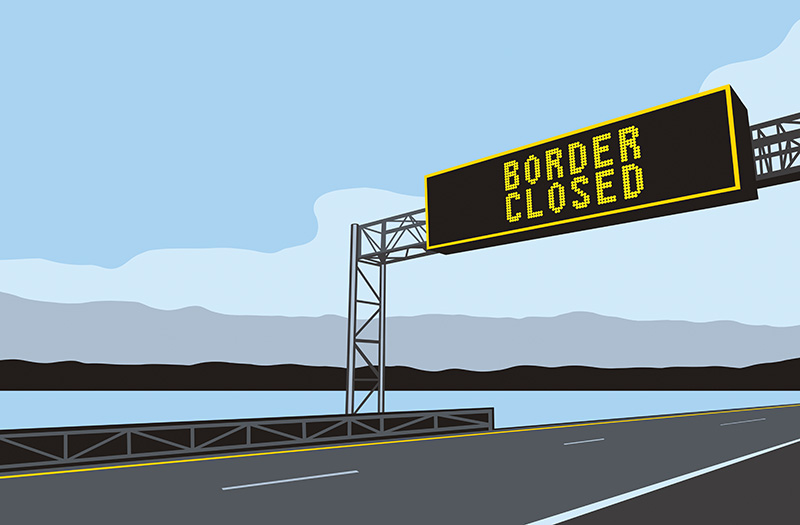
Chris Moshier’s girlfriend lives only a few miles from his Southfield home, just across the Canadian border in Windsor. Despite a pandemic-imposed divide that has lingered almost as long as they’ve been dating, they’ve needed only a short drive to see each other. Sort of.
Moshier would head toward downtown Detroit, past the bridge and tunnel border crossings that have been shut down for almost all traffic since February 2020, and continue south along the Detroit River. At the river’s shoreline near Boblo Island, he’d glance east.
“She goes to a park across the river, and we talk on the phone and look at each other through binoculars,” says Moshier, 61, a semi-retired businessman. “This is probably the strangest — yet the strongest — relationship either of us has ever had. It’s bizarre.”
Throughout the COVID-19 crisis, such offbeat workarounds have become a frustrating norm for countless people whose loves, labor, or leisure straddle metro Detroit’s international border but are deemed “non-essential.” Those lives and livelihoods have been upended for much longer than anyone could have imagined; as of early June, discussions were still underway about a reopening for non-essential travel by people vaccinated, but it was unclear what sort of proof would be acceptable at the border. (The City of Toronto in May canceled all major in-person events this summer, an indication of how cautiously the country is stepping as it emerges from the pandemic.)
The prolonged, unprecedented shutdown at the border is “social, it’s cultural, and it’s economic,” says Glenn Stevens, vice president of mobility for the Detroit Regional Chamber, the city’s business association. The Ambassador Bridge alone carries about $100 billion in goods each year, representing about a quarter of all trade between Canada and the United States. Much of that commerce has continued, but human beings have not had the same ease of access as parts and packages.
During the closure, crossings have been restricted to workers deemed “critical,” a definition that initially included healthcare and infrastructure workers but expanded over time. That resulted in a 90 percent reduction in non-commercial land crossings, according to the Canadian Border Services Agency. Some 6,000 Canadians have jobs in Southeast Michigan; most of them did not qualify as essential, Stevens says.
It has also cut off Canadian customers from Motor City offerings. About half of the 12,000 vehicles that used the tunnel daily before the closure were “going to the games, going shopping at Somerset, going to shop at you name it in the metro Detroit area” or seeking entertainment, says Carolyn Brown, CEO of Windsor Detroit Borderlink Ltd., which manages the Detroit-Windsor Tunnel. The economic impact has been less severe in the reverse direction, she says, because most spenders are U.S.-bound and many popular Canadian draws, including the Caesars Windsor Hotel & Casino, have been closed.
None of that mitigates the pain endured by those trapped on one side or the other, says Devon Weber, a New Yorker living in Canada and the founder of the open-border advocacy group Let Us Reunite. The organization represents more than 2,400 families nationwide who have been split by the closure.
“We understand this has been a hard year for everyone, and many made sacrifices, but imagine going through the hardest year of your life and being legally banned from traveling 20 minutes over the border to be with your wife when she gives birth, or to take care of your husband after he’s had a stroke,” Weber said via e-mail.
The mandate also turned the 21st of each month into a cruel and arbitrary dividing line between hope and disappointment. The Canadian border closure is really a series of one-month orders issued out of Ottawa that have been extended, month by month, for more than a year. “It’s been tough for me, and it’s caused a lot of stress,” says Jillian Morand, 27, from across the border in Windsor. Her husband, Eric Ratkowski, 28, is in Ferndale. “Right around that time I hold on to a tiny bit of hope that they will be able to open it and then, obviously, they don’t. It does affect my day. It’s stressful. It’s a lot of anxiety.”
Morand and Ratkowski got engaged right around the time the closure began. They eventually postponed a hoped-for wedding ceremony to 2022 but went ahead with a courthouse wedding in Michigan this past spring. The latter was enabled by one of the seemingly nonsensical inconsistencies of the shutdown: While land access was denied, the skies were wide-open.
For the nuptials, Morand’s father drove her four hours to Toronto, where she caught a flight to Detroit. When she returned to Canada, she had to quarantine for 14 days. “So, basically to see him for two weeks, I had to make adjustments in my life for a month,” she says. “A lot of planning went into that trip for something that we wouldn’t have thought twice about before the pandemic.”
All of this should return to normal in coming months; Canadian Prime Minister Justin Trudeau hinted at that in mid-May, saying “there is hope” for a “slightly better summer.”Ěý
Even when it ends, though, the separation will endure as a landmark in Moshier’s relationship. He’s eager for the day, he says, when he can quit his downriver drives and join his girlfriend for bike rides, hikes, kayaking trips, cabin getaways, and to “just do what normal couples do.”Ěý
|
| Ěý |
|







